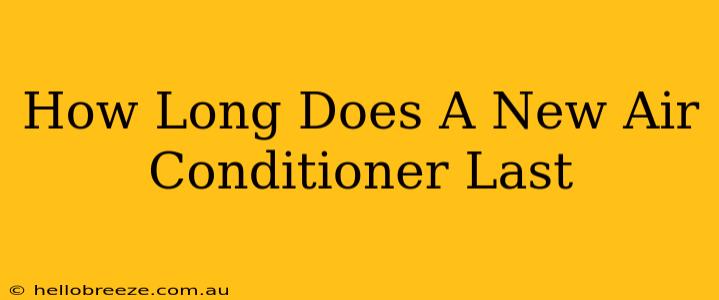Choosing a new air conditioner is a significant investment, so understanding its lifespan is crucial. This guide will explore the typical lifespan of various AC types, factors affecting longevity, and signs indicating it's time for a replacement.
The Average Lifespan of an Air Conditioner
The average lifespan of a properly maintained air conditioner is 10-15 years. However, this is just an average. Several factors influence how long your AC unit will actually last. Some units may only last 8 years, while others can easily surpass 20 years with diligent care.
Factors Affecting Air Conditioner Lifespan:
Several key factors significantly impact how long your air conditioner will function effectively:
-
Type of Air Conditioner: Different AC types have varying lifespans. For example, window units generally have shorter lifespans (8-10 years) compared to central air conditioning systems (15-20 years). Heat pumps, which can both heat and cool, often fall within the same range as central AC units.
-
Installation Quality: A poorly installed air conditioner is more prone to malfunctions and premature failure. Professional installation is essential for optimal performance and longevity.
-
Maintenance: Regular maintenance is paramount. Annual inspections and cleaning by a qualified HVAC technician can significantly extend the life of your system. Neglecting maintenance leads to reduced efficiency and increased wear and tear.
-
Usage Frequency: The more frequently you use your AC, the faster it will wear down. Continuous use in hot climates will naturally shorten its lifespan.
-
Climate Conditions: Extreme temperatures and humidity can accelerate wear and tear on your air conditioner. These conditions can put extra strain on the compressor and other components.
Signs Your Air Conditioner Needs Replacing
Recognizing the signs of a failing air conditioner is crucial to avoid unexpected breakdowns and high repair costs. Here are some key indicators:
-
High Energy Bills: A significant increase in your energy bills could signal an inefficient and failing system. Older AC units lose efficiency over time.
-
Frequent Repairs: Recurring repairs, especially on major components, can be an indication that it's more cost-effective to replace the entire unit.
-
Insufficient Cooling: If your air conditioner struggles to cool your home adequately, even on the coldest setting, it's likely losing its cooling capacity.
-
Unusual Noises: Loud banging, rattling, or grinding noises are often signs of internal problems requiring professional attention.
-
Leaks: Water leaks around the unit can indicate a refrigerant leak, which requires immediate professional attention. Ignoring this can lead to costly repairs and reduced cooling capacity.
-
Age: If your air conditioner is over 15 years old, it's nearing the end of its lifespan and may be becoming increasingly inefficient and unreliable.
Extending the Lifespan of Your Air Conditioner
You can take several proactive steps to extend the life of your AC unit:
-
Schedule Regular Maintenance: Annual checkups and professional cleaning are vital for maintaining efficiency and preventing problems.
-
Change Air Filters Regularly: Dirty filters restrict airflow, forcing the system to work harder, leading to premature wear. Change your filters according to the manufacturer's recommendations.
-
Protect Your Unit from the Elements: Keep the outdoor unit clear of debris and vegetation.
-
Address Problems Promptly: Don't ignore minor issues. Addressing small problems early prevents them from becoming major and costly repairs.
Conclusion: Investing in Longevity
While the lifespan of an air conditioner varies, understanding the factors influencing its longevity allows you to make informed decisions. Regular maintenance, prompt attention to problems, and choosing a high-quality unit from a reputable brand are all essential for maximizing the lifespan of your investment and ensuring comfortable and efficient cooling for years to come. Remember to consult with an HVAC professional for personalized advice based on your specific needs and climate.

